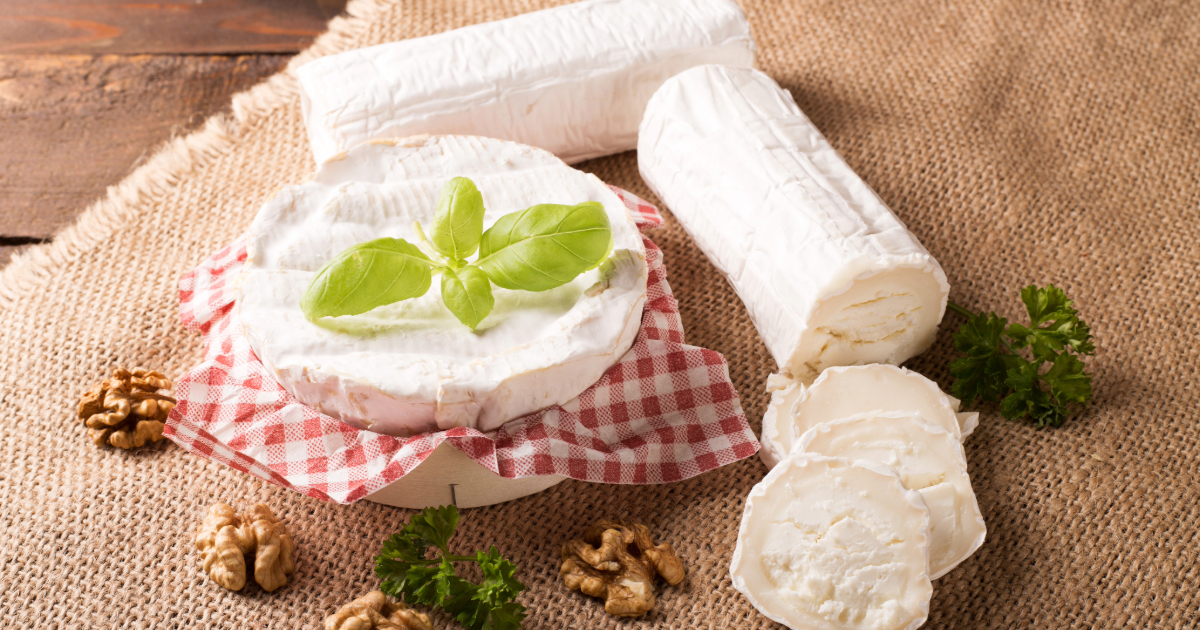Goat cheese and mozzarella cheese are both popular cheese choices with some notable differences.

When comparing goat cheese and mozzarella cheese, key factors like calories, macros, vitamins, and minerals should be considered to determine which option is healthier.
Ingredients and Preparation Methods
Goat cheese is made from goat's milk and comes in soft to hard textures. It can be fresh or aged for days to weeks. Mozzarella is traditionally made from buffalo milk using a process of curdling, draining, and kneading the curds in hot water to get the signature stringy texture.
Calorie Content
Goat cheese contains 364 calories per 100 grams while mozzarella has 280 calories. So goat cheese is moderately higher in calories. The extra calories in goat cheese come mainly from its higher fat content.
Carbohydrate Content
Goat cheese is lower in carbs with only 0.12 grams per 100 grams versus 3.1 grams in mozzarella. So for low-carb diets like keto, goat cheese would be the better pick.
Protein Content
Mozzarella has more protein - 27.5 grams protein per 100 grams compared to 21.58 grams in goat cheese. But both remain excellent sources of protein.
Fat Content
Goat cheese contains nearly double the amount of fat as mozzarella - 29.84 grams of fat per 100 grams versus 17.1 grams of fat in mozzarella. Goat cheese also has more saturated fat.
So for limiting total and saturated fat intake, mozzarella would be the better choice.
Vitamin Content
For vitamins, goat cheese wins for Vitamin A, B vitamins like riboflavin and niacin, and Vitamin E. Mozzarella is higher in Vitamin B12 and folate.
So goat cheese has an edge when it comes to overall vitamin content.
Mineral Content
Goat cheese has more iron, magnesium, potassium, copper and manganese. But mozzarella is richer in calcium, phosphorus, zinc, sodium, and selenium.
So no clear winner for minerals - it depends on which ones you want to get more of.
Health Benefits
Both goat cheese and mozzarella offer health perks. They’re packed with vitamins and minerals and could promote bone, dental, digestive and heart health.
Goat cheese may have added benefits for digestion and gut health thanks to the goat milk and its unique fat composition.
Key Takeaway: For calories and fat, mozzarella wins. But goat cheese has more vitamins, is lower carb, and offers unique gut health benefits.
Taste and Texture
Goat cheese ranges from soft to hard in texture and tends to taste tangy, earthy and tart, especially when aged.
Mozzarella has a soft, moist texture and mellow, milky flavor. Aged mozzarella can take on more complex flavors.
So personal preference plays a role here in choosing between the characteristic tang of goat cheese or milder mozzarella.
Cost Comparison
Goat cheese and mozzarella have a similar price point, costing around $2 per 100 grams. Premium artisanal versions of both can be pricier.
When buying, compare brands and varieties to find the best value. Soft goat cheese tends to be cheaper than aged.
Uses in Cooking & Baking
Both goat cheese and mozzarella work nicely in a variety of dishes:
- Salads
- Pastas
- Pizzas
- Appetizers
- Sandwiches
- Breakfasts
- Desserts
Goat cheese can be crumbled onto dishes or used as a spread. Mozzarella melts beautifully and is often baked or grilled.
So they both offer versatility in cooking, though their differing flavors and textures lend themselves to some dishes more than others.
Storage and Shelf Life
Properly stored in the fridge, fresh mozzarella will last around 1 week while soft goat cheese lasts up to 2 weeks.
Aged and harder varieties of both can last several weeks to a month when stored correctly. Always check expiration dates and use your judgment before eating.
Key Takeaway: Both offer cooking versatility and can be incorporated into sweet and savory dishes in numerous ways.
Nutrition Comparison Tables
For a helpful at-a-glance view, here are nutrition tables comparing calories, macros, vitamins and minerals in goat cheese versus mozzarella cheese:
Calories and Macros
| Nutrient | Goat Cheese (per 100g) | Mozzarella (per 100g) |
|---|---|---|
| Calories | 364 | 280 |
| Fat | 29.84g | 17.1g |
| Carbs | 0.12g | 3.1g |
| Protein | 21.58g | 27.5g |
Vitamin Content
| Vitamin | Goat Cheese | Mozzarella |
|---|---|---|
| Vitamin A | 407μg | 137μg |
| Riboflavin | 0.676mg | 0.34mg |
| Niacin | 1.148mg | 0.12mg |
| Vitamin B12 | 0.22μg | 0.73μg |
Mineral Content
| Mineral | Goat Cheese | Mozzarella |
|---|---|---|
| Calcium | 298mg | 575mg |
| Iron | 1.62mg | 0.2mg |
| Zinc | 0.66mg | 3.13mg |
| Selenium | 3.8μg | 15.7μg |
Which Cheese is Healthier: The Verdict
With goat cheese vs mozzarella, there's no clear-cut winner.
Goat cheese takes the lead for vitamins, minerals like iron and potassium, gut health promotion, lower carb and higher overall nutrition density.
But mozzarella wins for lower calories, fat and sodium. It also has more calcium and protein.
Ultimately, incorporating both into an overall healthy diet can provide nutritional diversity and unique health advantages. The key is consuming both in moderation as part of a balanced diet.
FAQs
Which cheese is higher in protein?
Mozzarella has more protein, with 27.5 grams per 100 grams versus 21.58 grams of protein in goat cheese. But both remain excellent sources.
Which cheese has more Vitamin A?
Goat cheese contains 107% more Vitamin A than mozzarella per 100 grams. So goat cheese is richer in this essential vitamin.
Which is higher in calcium?
Mozzarella contains 145% more calcium than goat cheese, with 731 milligrams per 100 grams compared to 298 milligrams in goat cheese.
Is goat cheese healthier than mozzarella?
It's not clear cut. Goat cheese has some added nutritional advantages but mozzarella is lower in calories and fat. Incorporating both as part of an overall healthy diet can provide balance. Moderation is key.
Can lactose intolerant individuals eat goat cheese?
Yes, goat cheese may be easier to digest for lactose intolerant individuals thanks to differences in the protein and fat composition compared to cow's milk cheeses. Many report tolerating hard goat cheeses well.
Conclusion
When comparing goat cheese and mozzarella side by side, both have unique nutritional advantages and disadvantages.
Choosing between the two depends on your personal health goals and preferences around taste, texture and cooking uses.

